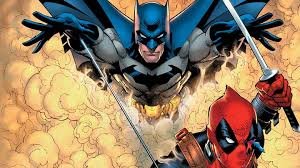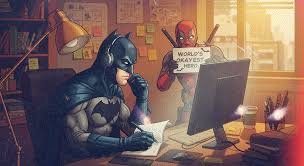
Deadpool Follows Batman’s Path in Bold New Direction
The Crossover of Tone Rather than Universes
The fantastically popular anti-hero Deadpool, Marvel’s own fourth wall-breaking ironic son-of-a-gun, is most synonymous with irreverent humor, graphic violence, and crude R-rated antics. However, recent developments in the Deadpool & Wolverine franchise highlight a surprising tonal evolution: Deadpool is becoming more in line with the darker tone and serious themes synonymous with DC’s own Batman. Though they represent two vastly different storytelling traditions, there are indications from insiders and trailers of Deadpool and Wolverine (2024) that they have been converging somewhat. This paper will discuss the implications of this transition for Batman’s legacy and what it will mean for superhero cinema.
Batman and Deadpool may represent narrative opposites. Batman began in 1939 as a grim, trauma-born vigilante bent on revenge and justice. Batman’s world contains moral complexity reminiscent of noir. The Shift: Proof and Evidence Deadpool (Wade Wilson), first appearing in 1991, only achieved mainstream popularity when Ryan Reynolds portrayed him in his R-rated Deadpool films (2016, 2018). While there is fast-paced chaos, Deadpool’s influences are an absurd take on traditional superhero tropes and an absurdly violent satire of superhero stories.
Despite all the absurdist humor, Deadpool shares thematic connections with Batman. Both characters exist in a world outside the rule of law, both are framed by trauma, and both have to cope with personal loss. The only obvious point of difference is Batman’s serious, grounded tone, which Deadpool is only just beginning to pick up.
The tonal shift in the upcoming Deadpool & Wolverine movie is not speculative; it’s evidenced by the film’s marketing, casting, and behind-the-scenes commentary. The inclusion of Hugh Jackman’s Wolverine brings an inherently somber and gritty presence, pushing Deadpool toward a more emotionally textured narrative.
More notably, director Shawn Levy has cited The Dark Knight trilogy as a cinematic influence. Trailers feature Deadpool in low-light environments, sporting more muted costumes, and engaging in serious dialogue—all hallmarks of Batman’s visual language. The score, reminiscent of Hans Zimmer’s orchestral dread, replaces the synth-pop quirkiness of earlier Deadpool films.

Following the Nolan Formula
Christopher Nolan’s Dark Knight trilogy set a precedent for elevating comic book movies into critically acclaimed cinema. Its use of psychological realism, socio-political commentary, and intense character studies redefined the superhero genre. Marvel, typically lighter and more comedic, has seen success with its formula, but Deadpool & Wolverine mark a rare turn toward that darker blueprint.
This parallels earlier franchise shifts: the MCU’s Captain America: The Winter Soldier took cues from political thrillers, and DC’s Joker (2019) echoed Taxi Driver. Deadpool’s new direction may signal another genre-blending attempt, leveraging Batman’s gravitas without sacrificing Marvel’s meta-narrative tone.
Several factors are influencing this move. The superhero genre is facing fatigue, with audiences demanding fresh narratives. Disney’s acquisition of Fox and the integration of X-Men into the MCU provide an opportunity to reboot characters with new creative latitude.
Ryan Reynolds, a producer on the film, has publicly acknowledged the desire to evolve the character. This suggests not just a stylistic change but a thematic maturation—Deadpool dealing with consequences, moral complexity, and legacy, much like Batman did under Nolan’s vision.
Additionally, the box office success of darker comic book films (The Batman, Logan, Joker) proves that there is both an appetite and a financial incentive for mature storytelling in this space.

Risks and Challenges
The transition to a darker tone is not without risks. Deadpool’s identity is tied to his absurdist humor and narrative unpredictability. If overcorrected, the film could alienate fans who cherish its comedic DNA. Furthermore, mimicking Batman’s style without understanding its psychological underpinnings risks reducing complexity to aesthetics.
Also, while Batman’s brooding persona emerged from a long-standing tradition in detective noir and gothic literature, Deadpool’s essence is postmodern and anarchic. Striking the balance between these traditions will be key.
Deadpool’s Batman-esque turn may signal broader genre evolution. Studios might increasingly hybridize character traits and narrative styles to combat franchise stagnation. It could also normalize tonal experimentation within the MCU, which has long been criticized for its uniform tone.
If successful, the film could open doors for other unconventional adaptations, such as a serious take on Howard the Duck or a noir-themed Spider-Man. Conversely, a poorly executed shift could reinforce skepticism about the fusion of genres.
It also intensifies the Marvel-DC interplay—not in terms of cinematic universe crossovers, but as creative competition. If Deadpool can thrive in Batman’s shadow, it redefines what Marvel’s characters are capable of thematically.
A Symptom of a Changing Industry
Deadpool stepping into Batman’s narrative shoes is not just a gimmick—it’s a reflection of shifting industry standards and audience expectations. As superhero cinema enters a post-peak phase, its icons must evolve or risk irrelevance. Deadpool’s darker reinvention may be the genre’s next frontier or an overreach—but it’s undeniably a significant moment.
FOR MORE UPDATES, VISIT KHILADICAFE